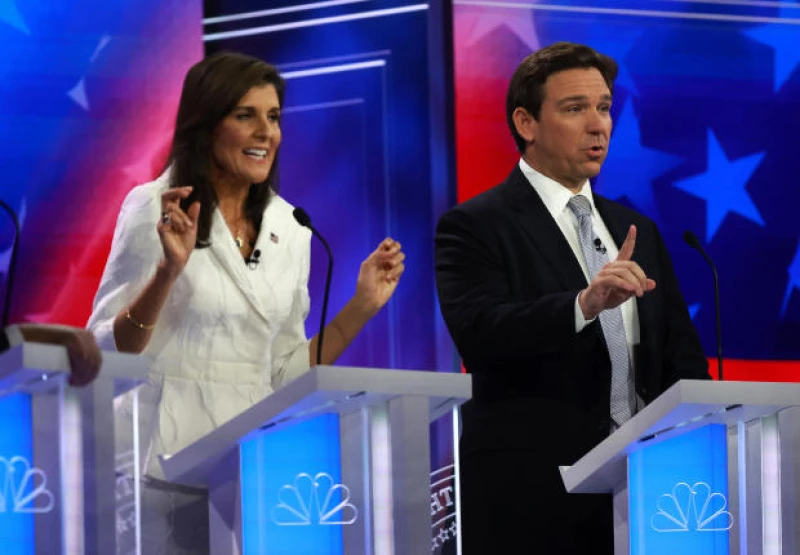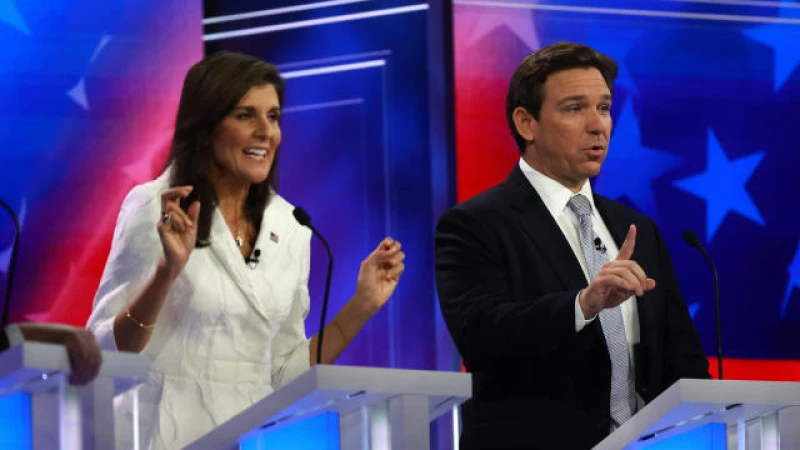Former President Donald Trump often seems proud to advertise his administration's record on speedily developing COVID-19 vaccines.
On the campaign trail to win another term in the White House, though, he also has knocked the use of those very vaccines. In October, for example, he unleashed a barrage of social media attacks on Ron DeSantis' pandemic record by reposting claims that the Florida governor — who is running against him in the Republican presidential primaries — was too active in vaccinating Sunshine State residents.
In a further twist, Trump simultaneously circulated an MSNBC article suggesting DeSantis wasn't vaccinating his constituents enough.
Trump's tap dance — touting Operation Warp Speed's success at developing vaccines while criticizing vaccine use — is emblematic of how pandemic politics are intensifying broader vaccine politics. Republican presidential candidates currently trailing the former president in polls are contorting their messaging to court the party's vaccine-skeptical voters. No one embraces, without qualification, the utility of a public health measure that has saved millions of lives.
Even the more established candidates, like Nikki Haley, can't escape the anti-vaccine sentiments of their party's base. Haley, who served as governor of South Carolina and ambassador to the United Nations, was initially pro-vaccine during the Trump administration. However, in a recent interview with the Christian Broadcasting Network, she made dubious claims against vaccines, including the unfounded belief that they could harm a woman's fertility. Despite studies consistently showing no such effect, Haley has embraced these anti-vaccine views.
This trend within the GOP poses a risk not only for the current election cycle but also for future public health policies. Lower vaccination rates among schoolchildren and seniors could result in increased cases of measles, shingles, and HPV. By weaponizing this rhetoric, presidential candidates are attempting to signal distrust in scientists, experts, and government authority as a cultural issue. However, their efforts have had little impact on the front-runner status of the former president.
A recent survey conducted by KFF revealed that partisanship plays a significant role in how people view vaccines. Confidence in the safety of updated COVID vaccines, for example, sharply divides along party lines, with over 80% of Democrats expressing trust compared to only 33% of Republicans. This divide in vaccine acceptance could have long-lasting implications for public health.
Source: JAMA Network
Source: KFF
But unease about COVID or the vaccines is not Republican primary voters' top issue — Blendon said concerns around the border, crime, and inflation are — and it's not clear vaccine-focused attacks hurt Trump.
"I didn't like his response to COVID," says an Iowa business owner featured in a critical ad from a well-funded political action committee that questioned Trump's handling of the pandemic. "I thought he probably got led a little bit by the bureaucrats," he says, hitting Trump on his bragging about the development of the vaccine and contrasting Trump unfavorably with certain governors the man in the ad thought performed better against COVID. (Images of DeSantis, otherwise unnamed, flash by.)
The result? The ad "produced a backlash" and, when audience-tested with focus groups, improved the former president's support, according to a memo summarizing the political action committee's attempts to dent the front-runner.
Candidates nonetheless are trying to make hay, acknowledged Joe Grogan, who led the Domestic Policy Council during the Trump administration. But "I think people have a lot of other targets for ire about the pandemic."
"Trump is not at the top of the list for Republican primary voters," Grogan said. "He's not on Page 2. Or 3, or 4. It begins with the media, the public health bureaucracy, or Big Tech companies."

Voters have strong, yet divided and sometimes inconsistent, opinions. Some, like Joshua Sharff, 48, of Chesapeake, Virginia, are opposed to the COVID vaccines and to candidates who support the shots as safe and effective. Sharff describes himself as a conservative voter who intends to support the Republican nominee for president. Though he's vaccinated, he said, "If you're a governor or a president and you tell me that I have to take a vaccine that has not been tried, that has not been tested, and ignores the science, that's a problem for me. You're taking away my freedoms as an American citizen."
These positions have led Sharff away from Trump — and toward DeSantis, who has promoted anti-vaccine and anti-public health positions in his quest for the nomination.
Trump "pushed the vaccine very hard and recently came out, when he began to get pushback on it, that it was somebody else's fault," Sharff said. "That's not true."
Other Republican voters said the vaccine is not key to their vote.
"It will not sway my vote one way or another," said Kimberly Hunt, 59, of Melville, Tennessee.
In chasing these voters, some candidates are distancing themselves from initial, pro-vaccine positions to embrace outspoken views against the shot. Vivek Ramaswamy, a biotech entrepreneur, started out as a vaccine cheerleader. But then he flipped, coming out against vaccine mandates and saying this summer that he regretted getting vaccinated. (His wife, a doctor, said she had no regrets.)
The most vocal of all is DeSantis.
Appearing on the right-leaning "PBD Podcast" on Oct. 30, a politician attacked a former president and "the corrupt medical swamp in D.C." for overselling a vaccine that, despite the initial federal guidance, could not prevent infection or transmission of COVID. The Centers for Disease Control and Prevention recommends the vaccine for anyone 6 months and older to protect against serious illness.
Though the politician initially encouraged people to get vaccinated in early 2021, they pivoted months later, banning vaccine passports for businesses and government entities, and later approving legislation prohibiting vaccine mandates in the state. That fall, they also appointed a new Florida surgeon general, physician Joseph Ladapo, whose guidance on COVID vaccines contradicts CDC recommendations. The politician formed a Public Health Integrity Committee to assess, and generally dispute, federal health recommendations.
When the CDC released new vaccine guidance in September, the state responded with its own advisory casting doubt on the safety of the boosters.
This anti-vaccine positioning hasn't helped the politician. They have been losing support nationally and is generally polling third behind Haley and Trump in New Hampshire, a key early primary state. They headlined a "medical freedom" town hall in Manchester on Nov. 1 with Ladapo as a special guest.
Among the candidates remaining, the politician may be the most famous convert to the politics of anti-vaccination, but, with this subject, Haley has more experience.
In the 2021 CBN interview, Nikki Haley said "mandates are not what America does." However, this forceful statement is just the culmination of a contradictory record, which critics argue shows her willingness to align with the demands of the GOP base. As a state legislator, she initially supported a 2007 legislation that included a mandate for HPV vaccines, but later voted against it. Furthermore, as governor, she vetoed an effort to promote those same vaccinations.
Bakari Sellers, who was a lawmaker at the time and now serves as a commentator on CNN, spearheaded the bill that included the HPV vaccine mandate. He told KFF Health News, "That's the biggest Nikki Haley issue that there is: She kind of has her finger in the air."
The issue of vaccines may have an impact on the general election. While former President Trump defends his vaccine record, it is evident that he has support from the anti-vaccine crowd. An analysis by Politico found overlap among donors to independent presidential candidate Robert F. Kennedy Jr., who staunchly opposes vaccines, and Trump.
The willingness of politicians to criticize what has traditionally been seen as a fundamental achievement of public health is likely to create challenges for doctors themselves. Allison Ferris, a primary care physician and associate professor at Florida Atlantic University, emphasized that people should listen to their doctors rather than presidential candidates when deciding whether to take the new COVID vaccines. However, delivering this message is difficult in the current climate.
"It is a tricky position to be in," said Ferris, who co-authored recently released guidance advising doctors to counsel patients that frequent COVID vaccination will likely become a necessity.
KFF Health News, previously recognized as Kaiser Health News (KHN), is a nationwide newsroom that specializes in comprehensive reporting on health matters. It is one of the key programs at KFF, an independent organization dedicated to health policy research, polling, and journalism.







